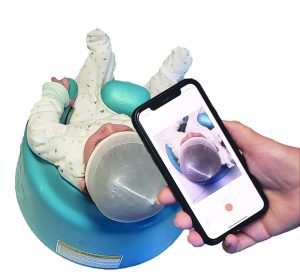
In 2018, Fereshteh Aalamifar, who earned her PhD in electrical and computer engineering in 2016, and her husband Reza Seifabadi launched SoftSpot, now the only FDA-cleared mobile app for infant cranial measurements. SoftSpot assists pediatricians and parents with early detection, monitoring, and treatment of cranial conditions, which— if left untreated—can affect babies’ brain development in some cases.
What compelled you to tackle this particular health care challenge?
My passion for children, my own struggles as a new mother, and my desire to make health care accessible to families inspired me to found PediaMetrix. After I had my first child, I learned that a significant amount of skull growth happens in the first months and how crucial it is during that time to look at the skull’s size and shape as it grows.
How does your approach to solving this problem differ from other methods?
Pediatricians relied on visual assessments and according to some statistics, up to 600,000 infants miss the window of early detection of cranial deformities every year in the U.S. SoftSpot runs on almost all mobile phone devices, enabling parents and clinicians to upload photos of a baby’s head and receive a report about the child’s skull shape. SoftSpot enables users to make informed decisions earlier and more easily because it can continuously provide objective and quantitative data when sporadic, subjective, or visual assessment is the only alternative. However, it does not replace a clinical professional.

What obstacles did you encounter while developing this technology?
Getting access to clinical data and learning and then implementing regulatory compliance were the biggest challenges in the early years. Thanks to advocates, we were able to collaborate with several children’s hospitals in the U.S. to conduct clinical studies.
What other areas of health care do you envision your technology being applied to?
Our next version of SoftSpot will use a 3D model of a baby’s head to identify and plan for cases that require surgery and to eliminate the need for additional scans that can expose a baby to radiation.
What are the next frontiers or challenges you hope to address in the health care space?
My passion lies in using technology advances to create equal access to health and wellness for people in all communities, including low-resource populations. Above all, I would like to contribute to ensuring every child gets the best start in life.




